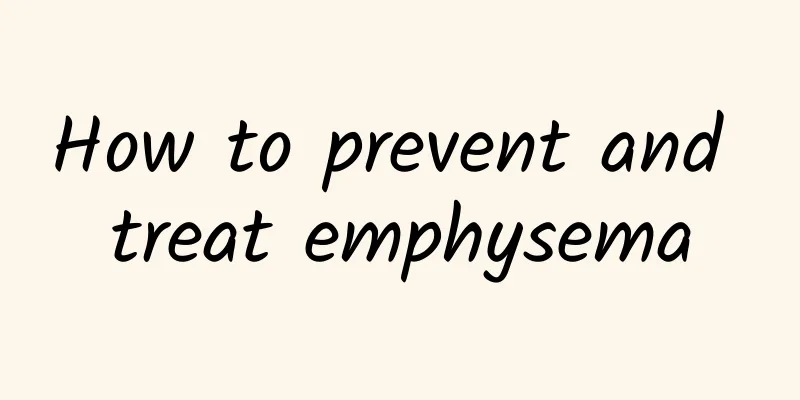What to do if you have tracheitis and cough during pregnancy

|
If a pregnant woman gets tracheitis after pregnancy, she must pay attention at this time, especially when taking medications. In the first three months of pregnancy, the fetus is at a critical moment of development. If the medication is improper at this time, deformities often occur, which can easily lead to miscarriage. After getting tracheitis, you can use certain methods to treat it. During the treatment process, you must follow the doctor's advice. It is also important to regulate and maintain your health in daily life. What to do if pregnant women have tracheitis and cough Tracheitis is an inflammation caused by damage to the bronchial mucosa due to viral or bacterial infection, physical or chemical stimulation or allergic reaction, and often occurs in cold seasons or when the temperature changes suddenly. Acute bronchitis generally has an acute onset and a short course, and usually improves in one to three weeks. However, some cases do not heal and develop into chronic bronchitis. Chronic bronchitis is more common in the elderly, with a prevalence of 10-15% in people over 50 years old. It is also caused by infectious or non-infectious factors. The clinical manifestations are coughing, sputum production or wheezing that lasts for more than three months each year for more than two consecutive years. Early symptoms are mild, mostly occurring in winter, and relieved in the spring. In late stages, inflammation worsens and symptoms persist all year round, regardless of season. So, what should pregnant women do if they have tracheitis cough? Pregnant women with tracheitis cough can drink some light salt water in moderation, which is very helpful in relieving tracheitis cough and can also play a preventive role. Of course, if the condition is serious, you should seek medical attention in time and follow the doctor's advice. Pregnant women should also pay attention to their diet during coughing 1. Avoid eating raw, cold and cool foods, including various ice drinks; sour and astringent foods such as vinegar, sour cabbage, kimchi, hawthorn, black plum, sour citrus, ginkgo, lotus root nodes and unripe persimmons and crabapples, etc. 2. Avoid eating all nourishing, greasy, and sour foods, such as pork, duck, lamb, glutinous rice, astragalus, polygonatum, ophiopogon, ginseng, placenta, donkey-hide gelatin, various sea fish, shrimp, crab, longan meat, pomegranate, black plum, and various sticky desserts. Does a pregnant woman's cough affect the fetus? Coughing during pregnancy is very uncomfortable. Pregnant women often hold their stomachs but dare not cough hard. Sometimes coughing a little hard can easily lead to urinary incontinence, which is very embarrassing. Coughing during pregnancy generally does not affect the fetus. A mild cough itself has no effect on the fetus, but if it is a severe cough, it may cause increased abdominal pressure, leading to uterine contraction and increasing the possibility of miscarriage. Prolonged coughing in pregnant women can cause the following two harms to the fetus. 1. The indirect effects of high fever caused by colds and toxins produced by metabolic disorders. High fever and toxins can stimulate uterine contractions, causing miscarriage and premature birth, and increasing the neonatal mortality rate. 2. The virus enters the fetus directly through the placenta, which may cause congenital heart disease, cleft lip, hydrocephalus, anencephaly and microcephaly. Therefore, if the expectant mother only has a mild cold, with only sneezing, runny nose and mild cough, she does not need to take medicine. She can pay attention to rest and drink plenty of water, and she can often recover without treatment. If the symptoms still do not improve, or if high fever, severe cough, etc. occur, you should go to the hospital for diagnosis and treatment. Do not take medicine on your own to avoid taking inappropriate medicine or affecting the growth and development of the fetus. |
<<: What causes frequent burping?
>>: What are the signs before the event?
Recommend
How to treat premature ejaculation
How to treat premature ejaculation? Many people m...
Indurated acne
Acne, which is what we often call pimples. This d...
Benefits of Tongkat Ali Tea
Nowadays, many people also use Tongkat Ali to mak...
Angelica Blood-Nourishing Soup, drink more if you have Qi deficiency and blood deficiency!
Angelica is a common Chinese medicinal ingredient...
Can tea water with salt cure skin diseases?
Adding salt to tea water can have a certain effec...
What to do if you have urinary tract infection and blood in your urine? Chinese medicine recommends eight dietary treatments
If you experience frequent and urgent urination, ...
What are the symptoms of a baby with a hot temper?
Many babies usually need to drink a lot of breast...
Rescue of poisoning caused by Chuanwu and Caowu
Aconitum kusnezoffii is a traditional Chinese med...
Men can't ejaculate after drinking
Many men will find that they can never ejaculate ...
Why do you snore and blow air when you sleep?
Snoring is commonly known as snoring. This diseas...
What are the effects of Codonopsis pilosula wine
my country's liquor culture has been widely s...
What to do if your toes are turned outward
In our lives, there are many people who suffer fr...
What to do if you have pharyngitis during pregnancy
When a woman is pregnant, her body's resistan...
What should I do if a piece of hair falls out?
In our daily life, hair loss is a very common phe...
Corrective osteotomy
As for osteotomy correction surgery, it is actual...









